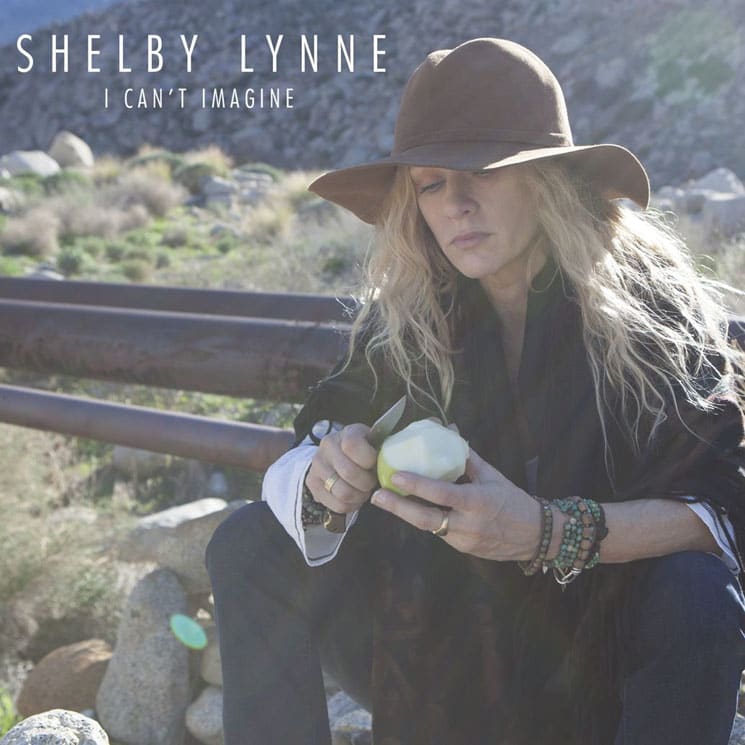Shelby Lynne's rich, stop-you-in-your-tracks powerhouse of a voice has remained a constant throughout her career, but her recorded output has occasionally been marred by uncomfortable compromises when faced with the demands of an industry that rewards easy categorization and commercial performance. To wit, the several major-label releases that preceded 1999's I Am Shelby Lynne have now largely been written out of her story, and Lynne herself has often seemed uncertain of the path to follow after that critical breakthrough; in an ironic twist, she found more solid artistic footing with 2003's Identity Crisis.
On I Can't Imagine, Lynne's 13th studio album and first for Rounder, the Alabama-bred singer abandons the comfort of her own Everso Records, but the fiercely independent musical spirit that animated her two most recent, deeply personal full-lengths is still strong. If 2011's Revelation Road mostly touched on the quieter aspects of Lynne's music, the warm, crisp sound of the self-produced and largely self-penned I Can't Imagine showcases an exceptionally tight band that moves easily from atmospheric Americana ("Back Door Front Porch," an impressionistic, nostalgic lament) to smooth country-soul ("Sold the Devil [Sunshine]," whose funky Wurlitzer and lazy backyard BBQ vibe barely mask the lyrics' typically dark edges) to torchy gospel (the rousing "Love Is Strong," written with Ron Sexsmith, could be an outtake from Elvis's 1969 American Studio sessions).
Lynne's writing is as confessional as ever ("Paper Van Gogh" finds the singer accepting and embracing her flaws, while "Following You" addresses her relationship with her late father), but she doesn't shy away from broader sociopolitical issues, either. On the anthemic "Down Here," she tackles Southern intolerance towards the LGBT community ("Down in the country / Out in the hills / Out in the country / Three-dollar bills") over clipped, duelling electric guitars that deliberately evoke the raging sound of "Southern Man," Neil Young's own civil rights plea; on "Son of A Gun," Lynne paints a vivid portrait of Depression-era migrant poverty that still resonates forcefully in 2015.
I Can't Imagine closes with the title song, an elegant, pedal steel-driven country ballad where the singer seeks to bring comfort to a broken soul. "I ain't afraid of your pain / I can heal it baby," she sings — and for those brief three minutes, she does. She's still Shelby Lynne, and she's only getting better.
(Rounder)On I Can't Imagine, Lynne's 13th studio album and first for Rounder, the Alabama-bred singer abandons the comfort of her own Everso Records, but the fiercely independent musical spirit that animated her two most recent, deeply personal full-lengths is still strong. If 2011's Revelation Road mostly touched on the quieter aspects of Lynne's music, the warm, crisp sound of the self-produced and largely self-penned I Can't Imagine showcases an exceptionally tight band that moves easily from atmospheric Americana ("Back Door Front Porch," an impressionistic, nostalgic lament) to smooth country-soul ("Sold the Devil [Sunshine]," whose funky Wurlitzer and lazy backyard BBQ vibe barely mask the lyrics' typically dark edges) to torchy gospel (the rousing "Love Is Strong," written with Ron Sexsmith, could be an outtake from Elvis's 1969 American Studio sessions).
Lynne's writing is as confessional as ever ("Paper Van Gogh" finds the singer accepting and embracing her flaws, while "Following You" addresses her relationship with her late father), but she doesn't shy away from broader sociopolitical issues, either. On the anthemic "Down Here," she tackles Southern intolerance towards the LGBT community ("Down in the country / Out in the hills / Out in the country / Three-dollar bills") over clipped, duelling electric guitars that deliberately evoke the raging sound of "Southern Man," Neil Young's own civil rights plea; on "Son of A Gun," Lynne paints a vivid portrait of Depression-era migrant poverty that still resonates forcefully in 2015.
I Can't Imagine closes with the title song, an elegant, pedal steel-driven country ballad where the singer seeks to bring comfort to a broken soul. "I ain't afraid of your pain / I can heal it baby," she sings — and for those brief three minutes, she does. She's still Shelby Lynne, and she's only getting better.
